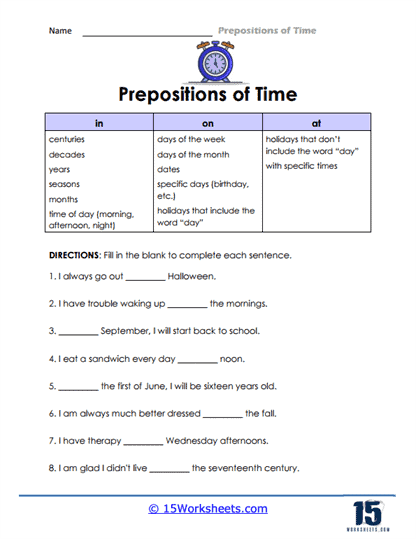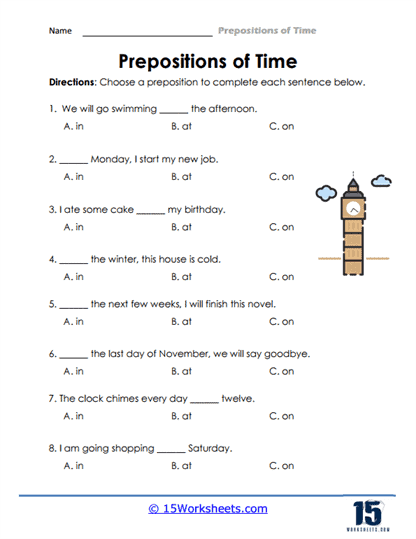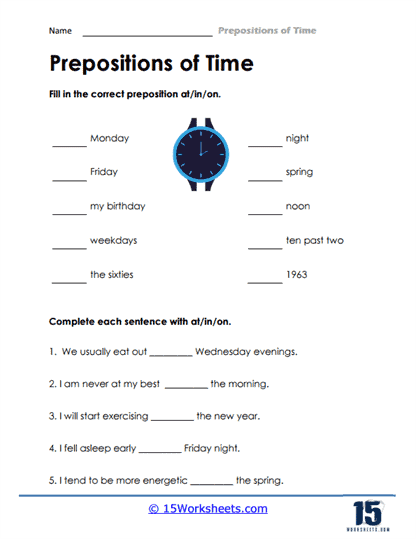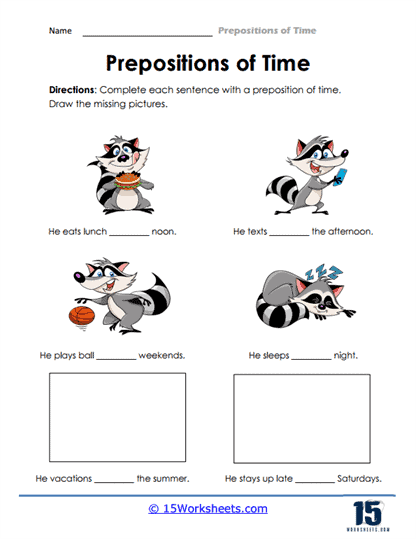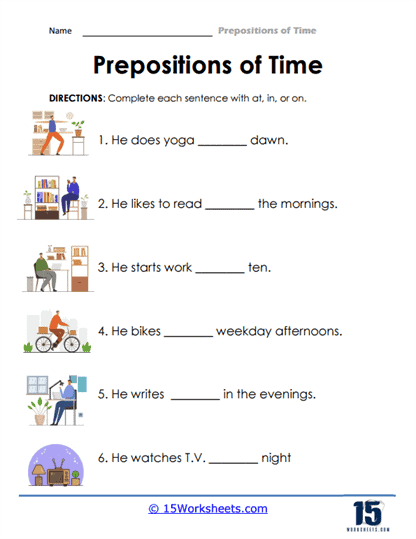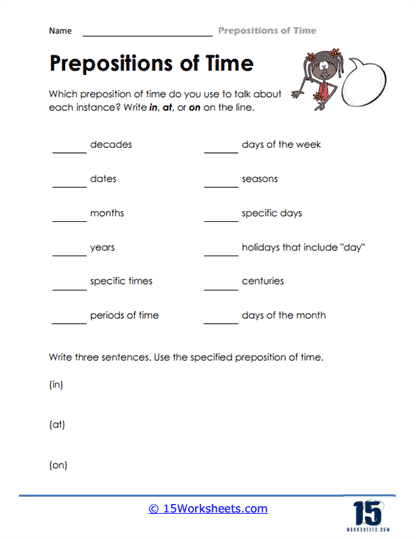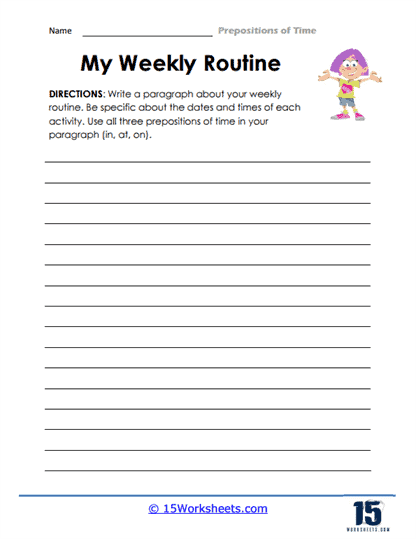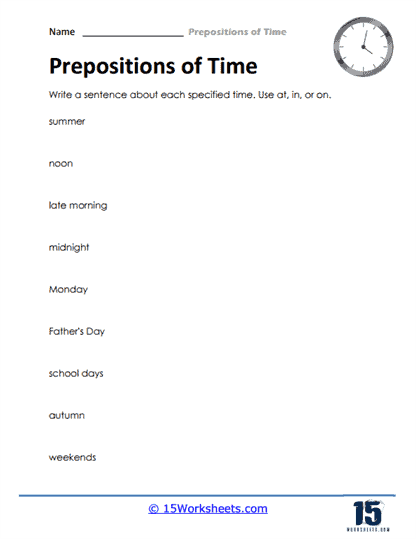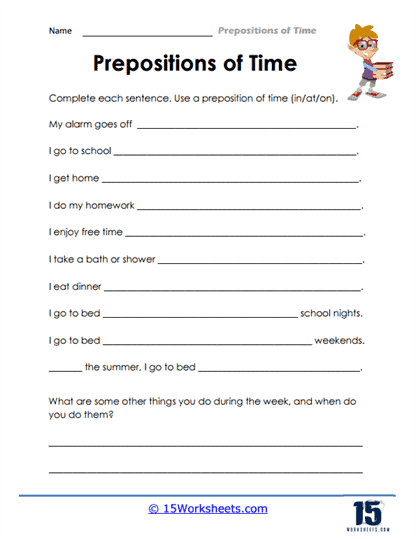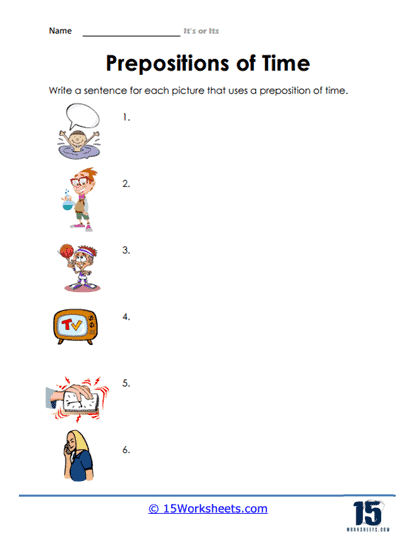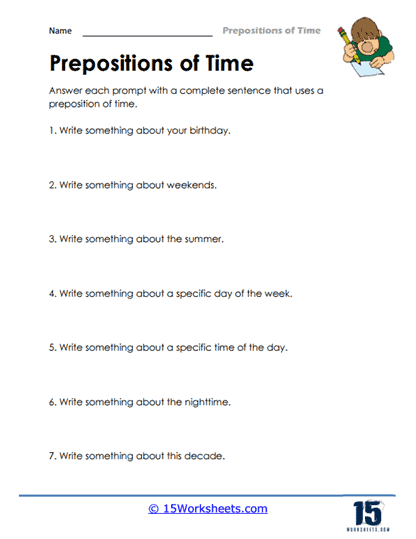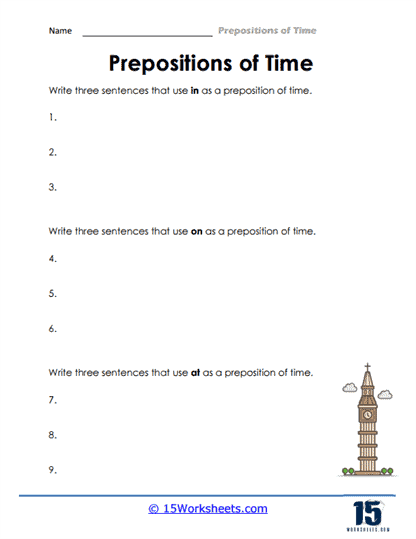Prepositions of Time Worksheets
All About These 15 Worksheets
These prepositions of time worksheets are a helpful tool for teaching and reinforcing this essential topic in English grammar. Prepositions of time indicate the time or duration of an event or action.
These worksheets include examples and exercises to help students identify prepositions of time in sentences and use them correctly. They also include activities such as matching prepositions of time with corresponding pictures or sentences, filling in the blanks with the correct preposition of time, and writing sentences that use prepositions of time. Through these worksheets, students will:
- Complete sentences by supplying them with the correct and appropriate prepositions of time;
- Be familiar with the prepositions of time and how to use them in varying instances;
- Write their own sentences using prepositions of time correctly;
- And respond to writing prompts while observing the correct usage of prepositions of time.
By completing these worksheets, students can develop a better understanding of how prepositions of time work and how they can be used to describe the timing and duration of events and actions in a sentence. This can help them improve their communication skills and time management.
What are Prepositions of Time?
The words or groups of words that show the relationship between time, direction, and place to the other parts of a sentence are called prepositions.
Prepositions of time refer to the prepositions that indicate the time period of a certain incident or action. For example:
- I have to go to work every day at 9 AM.
- Her last exam is on Monday.
- This mall opened in 2017.
The prepositions in, on, and at are the basic prepositions of time, enabling us to understand when a particular action takes place.
Some commonly used prepositions of time include: in, on, at, until, to, from, since, for, before, after, by, and during. The prepositions of time describe the happenings in terms of the exact time, day of week, months, years, seasons, centuries, and more time frames. Improve your vocabulary and add fluency to your speech by looking at this detailed list of prepositions of time and how to use them in sentences.
In: In shows the happenings in an infinite time frame. Be it months, years, seasons, or centuries. Common exceptions include in the morning, ten minutes, three years, etc.
Examples:
- My grandfather was born in 1901.
- I will avail my annual holidays in December.
- We love going on a vacation in the summers.
On: The preposition On shows the actions happening on a specific day or date.
Examples:
- We’ll meet the family on Sunday.
- I have my doctor’s appointment on the 12th.
- She’ll be at my place on the 4th of July.
At: At is used to indicate the exact time. At night and at the moment are a few exceptions.
Examples:
- My shift starts at 11 AM.
- We have to pick up the kids at 4 PM.
- Why don’t you meet us at 11 PM?
From…to: From…to indicates a time frame with clear starting and ending periods.
Examples:
- We have to accommodate the guests from Monday to Wednesday.
- Rishabh worked at the bar from June to August.
- My grandfather rests every day from 4 to 5:30 PM.
Until: Until describes a time or event with a specified or unspecified ending time.
Examples:
- I refuse to sit down at the table until he apologizes.
- The monsters will not stop until they’ve destroyed the whole village.
- You will have to wait until everyone has said their piece.
Since: Since indicates an event that started in the past and is still continuing in the present.
Examples:
- Alex hasn’t clocked in since yesterday.
- She has been on pain meds since the surgery.
- I have known Ben since he was in junior high.
For: For shows an amount of time in the settings of present, past, or future.
Examples:
- She has been taking therapy for a long time.
- The boys waited for six long years to see each other again.
- She wants to stay with us for a week.
Before: Before shows the beginning or starting time of an event.
Examples:
- Let’s head home before it starts to rain.
- I hope she’s able to hold herself together before the guests arrive.
- Should we leave before the teacher gets back?
After: After indicates the ending time of an event.
Examples:
- She stopped wailing after her father picked her up.
- The coach stopped shouting after the player hit him with the ball.
- After the accident, Jamie was put on a liquid diet.
During: During indicates the entire time period of an action or an event.
Examples:
- The whole class kept yawning during the boring presentation.
- I might end up throttling the next person who disturbs me during my work.
- Will you please stay quiet during the movie?
By: By indicates the extent of happening or ending of an event.
Examples:
- I will be ready by 10 PM.
- We have to be at the concert by 7 PM.
- Will you please submit the assessment by noon?

